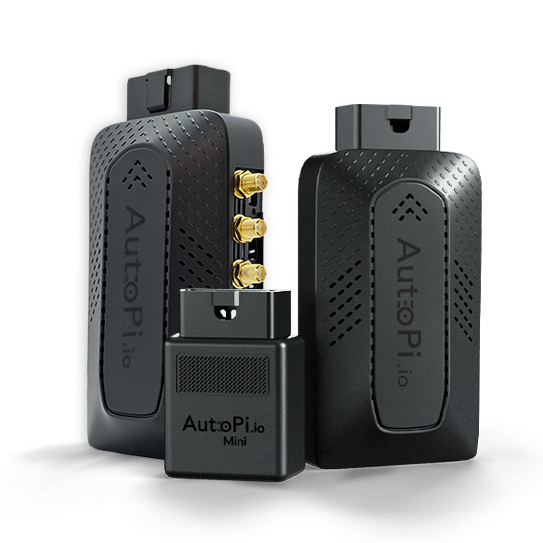Can Manager
Converters
can
Converts raw CAN data using the CAN database available for the current protocol. The CAN database file (.dbc) is found on the local file system by the following path expression:
/opt/autopi/obd/can/db/protocol_<PROTOCOL ID>.dbc
Handlers
autodetect
Autodetection of interfaces and their supported protocols.
connection
Manages the CAN connections.
OPTIONAL ARGUMENTS
open(bool): Attempt to open connection. Defaults toTrueif autodetecting, otherwise, don`t change connection state.
dump
Stores messages from the CAN bus to a file until a limit or duration is reached.
ARGUMENTS
file(str): Write data to a file with the given name. Supported file extensions are.asc,.blf,.csv,.dband.log.
OPTIONAL ARGUMENTS
duration(int): How many seconds to record data? Default value is1.limit(int): The maximum number of messages to read.receive_timeout(float): The amount of time in seconds to wait for a reply message. Default value is0.2.skip_11bit_ids(bools): Skip all messages with 11bit arbitration IDs. Default value isFalse.skip_29bit_ids(bools): Skip all messages with 29bit arbitration IDs. Default value isFalse.skip_error_frames(bool): Skip all messages marked as error frames. Default value isFalse.skip_remote_frames(bool): Skip all messages marked as remote frames. Default value isFalse.skip_normal_frames(bool): Skip all messages marked as normal data frames. Default value isFalse.pass_filters(list): List of arbitration ID filters which are allowed to be received.keep_listening(bool): Continue listening for messages in the background? Default value isFalse.buffer_size(int): The limit of messages that the internal queue can hold. If the value is less than or equal to zero, the queue size is infinite. Default value is0.bus(str): Name of bus to use. Defaults to can_conn.DefaultBus mapping.conn(str): Name of the CAN interface to use.sanitize(bool): Enable/disable input sanitization. Defaults toTrue.
OPTIONAL ARGUMENTS FOR ASC AND BLF FILES
channel(int): The default value to use when a message does not have a channel set. Default value is1.
OPTIONAL ARGUMENTS FOR CSV FILE
append(bool): Append messages to an existing file where no header line is written or truncate and start with a newly written header line? Default value isFalse.
OPTIONAL ARGUMENTS FOR DB FILE (SQLITE)
table_name(str): The name of the table to store messages in. Default value ismessages.
OPTIONAL ARGUMENTS FOR LOG FILE
channel(str): The default value to use when a message does not have a channel set. Default value isvcan0.append(bool): Append messages to any existing file or truncate it? Default value isFalse.
external_dump
Helper for performing CAN dump with external process.
external_dump_match
Helper for performing CAN dump matching with external process.
filter
Display and management of CAN filters.
ARGUMENTS
*channels(str): The channel(s) to include in the result. If none defined all channels are included.
OPTIONAL ARGUMENTS
bus(str): Name of a specific bus to display or change.add(str): The CAN arbitration ID to add as filter.mask(str): The bitmask to use with the CAN arbitration ID to perform filtering. If not specified, the value is automatically set to the highest possible, meaning a perfect match with the defined CAN arbitration ID.is_ext_id(bool): Explicit indication of whether to use extended CAN arbitration ID or not (29 or 11 bit). If omitted, the value will be inferred automaticlly by the length of the defined CAN arbitration ID.clear(bool): Clear any existing filters? This is always done before adding. Default value isFalse.
EXAMPLES
can.filter can0can.filter can0 bus=dumpcan.filter can0 bus=dump add=7E0can.filter can0 bus=dump clear=truecan.filter can0 bus=dump clear=true add=x7E0can.filter can0 bus=dump clear=true add=x7E0 mask=x7FFcan.filter can0 bus=dump clear=true add=x7E0 mask=x7FF is_ext_id=false
j1939_query
Queries a J1939 PGN on the CAN bus.
ARGUMENTS
pgn(int): Number of the PGN to query.
OPTIONAL ARGUMENTS, J1939 QUERY SPECIFIC
priority(int): The priority to use for the request message. Default value is6.destination_address(int): The destination address of the request message. Default value is0.source_address(int): The source address of the request message. Default value is249(Service Tool).auto_filter(bool): Ensure to apply filtering to only include reply message for the specific PGN. Default value isTrue.auto_filter_mask(int): The bitmask to use when the filter is applied. Default value is0x00FFFF00.auto_tp(bool): Automatically enable Transport Protocol (TP) for multi-frame messages. Default value isTrue.
OPTIONAL ARGUMENTS, GENERAL
name(str): Name of the command. (E.g.VehicleSpeedorSeatTemperature)output(str): Selectobj,dictorstras the output data type of the reply messages. Ignored if formula argument is given. Default value isstr.formula(str): Python code that decodes the raw byte data to a value.conn(str): Name of the CAN interface to use.bus(str): Name of the bus instance to use. Default value isdefault_query_j1939.sanitize(bool): Enable/disable input sanitization. Defaults toTrue.
OPTIONAL ARGUMENTS, QUERY GENERAL
pass_filters(list): List of pass filters to use for receiving reply frames.ensure_filtering(bool): Ensure that reply messages not matching the filters are excluded. Default value isTrue.flow_control(list): List of flow control ID resolvers to enable. Options areobdandcustom.custom_flow_control_id_mappings(dict): ID mappings to use for custom flow control.replies(int): The amount of reply messages to wait for within a timeout.skip_error_frames(bool): Skip any reply message marked as an error frame. Default value isTrue.skip_remote_frames(bool): Skip any reply message marked as a remote frame. Default value isTrue.strict(bool): Raise an error when no reply messages are received or if the amount of expected reply messages is not met within the timeout. Default value isTrue.timeout(float): The amount of time in seconds to wait for a reply message. Default value is0.2.
monitor
Monitors messages on the CAN bus until a limit and/or duration is reached.
OPTIONAL ARGUMENTS
duration(float): How many seconds to record data? Default value is1.limit(int): The maximum number of messages to read.receive_timeout(float): The amount of time in seconds to wait for a reply message. Default value is0.2.skip_error_frames(bool): Skip any reply message marked as an error frame. Default value isFalse.bus(str): Name of bus to use. Defaults to can_conn.DefaultBus mapping.conn(str): Name of the CAN interface to use.keep_listening(bool): Continue listening for messages in the background? Default value isFalse.bus_keep_alive(bool): Will keep the bus and its settings alive after the handler is finished. Forced to True if keep_listening is set. Default value isFalse.buffer_size(int): The limit of messages that the internal queue can hold. If the value is less than or equal to zero, the queue size is infinite. Default value is0.output(str): Selectobj,dictorstras the output data type of the reply messages. Ignored ifdbcargument is given. Default value isstr.dbc(str): Path of the can database file (like .dbc) for filtering and decoding.mask(str): Mask to apply to filters and CAN database for decoding.sanitize(bool): Enable/disable input sanitization. Defaults toTrue.
obd_query
Queries an OBD-II PID on the CAN bus.
ARGUMENTS
name(str): Name of the command.
OPTIONAL ARGUMENTS, OBD-II QUERY SPECIFIC
mode(str): Service section of the PID.pid(str): Code section of the PID.bytes(int): Byte size of individual returned frame(s). Default value is0.frames(int): Expected frame count to be returned?strict_lengths(bool): Enforce strict validation of specifiedbytesand/orframes. Default value isFalse.decoder(str): Specific decoder to be used to process the response.unit(str): Unit of the result.auto_filter(bool): Ensure to apply filtering to only include OBD-II reply messages. Default value isTrue.auto_format(bool): Ensure that the PID request message always has a fixed data length of 8 bytes (zero padding). Default value isTrue.id(int): Use a custom CAN arbitration ID for the PID request message.is_ext_id(bool): Enforce to use extended CAN arbitration ID or not (29 or 11 bit) for the PID request message.extended_address(int): Extended address value that will be set as the first data byte.zero_padding(int): Number of zero padding bytes to add to data. Defaults to8whenauto_formatis set toTrue.
OPTIONAL ARGUMENTS, GENERAL
formula(str): Python code that decodes the raw byte data to a value.conn(str): Name of the CAN interface to use.bus(str): Name of the bus instance to use. Default value isdefault_query_obd.sanitize(bool): Enable/disable input sanitization. Defaults toTrue.
OPTIONAL ARGUMENTS, QUERY GENERAL
pass_filters(list): List of pass filters to use for receiving reply frames.ensure_filtering(bool): Ensure that reply messages not matching the filters are excluded. Default value isTrue.flow_control(list): List of flow control ID resolvers to enable. Options areobdandcustom.custom_flow_control_id_mappings(dict): ID mappings to use for custom flow control.replies(int): The amount of reply messages to wait for within a timeout.skip_error_frames(bool): Skip any reply message marked as an error frame. Default value isTrue.skip_remote_frames(bool): Skip any reply message marked as a remote frame. Default value isTrue.strict(bool): Raise an error when no reply messages are received or if the amount of expected reply messages is not met within the timeout. Default value isTrue.timeout(float): The amount of time in seconds to wait for a reply message. Default value is0.2.
play
Sends all messages from one or more dump files on the CAN bus.
ARGUMENTS
*files(str): Specify one or more dump files for playback.
OPTIONAL ARGUMENTS
ignore_timestamps(bool): Ignore the timestamps of the messages and use themin_gapparameter as the time between messages instead. Default value isFalse.min_gap(float): Minimum time between sent messages in seconds. Default value is0.0001.skip_gaps_gt(float): Skip periods of inactivity greater than this (in seconds). Default value is86400.include_error_frames(bool): Also send messages marked as error frames? Default value isTrue.bus(str): Name of bus to use. Defaults to can_conn.DefaultBus mapping.conn(str): Name of the CAN interface to use.sanitize(bool): Enable/disable input sanitization. Defaults toTrue.
query
Queries by sending one or more request messages on the CAN bus and then waits for one or more reply messages.
ARGUMENTS
*messages(can.Message|str): CAN request messages to send.
OPTIONAL ARGUMENTS, GENERAL
name(str): Name of the command (e.g.VehicleSpeedorSeatTemperature).output(str): Selectobj,dictorstras the output data type of the reply messages. Default value isstr.formula(str): Python code that decodes the raw byte data to a value.conn(str): Name of the CAN interface to use.bus(str): Name of the bus instance to use. Default value isdefault_query.sanitize(bool): Enable/disable input sanitization. Defaults toTrue.
OPTIONAL ARGUMENTS, QUERY GENERAL
pass_filters(list): List of pass filters to use for receiving reply frames.ensure_filtering(bool): Ensure that reply messages not matching the filters are excluded. Default value isTrue.flow_control(list): List of flow control ID resolvers to enable. Options areobdandcustom.custom_flow_control_id_mappings(dict): ID mappings to use for custom flow control.replies(int): The amount of reply messages to wait for within a timeout.skip_error_frames(bool): Skip any reply message marked as an error frame. Default value isTrue.skip_remote_frames(bool): Skip any reply message marked as a remote frame. Default value isTrue.strict(bool): Raise an error when no reply messages are received or if the amount of expected reply messages is not met within the timeout. Default value isTrue.timeout(float): The amount of time in seconds to wait for a reply message. Default value is0.2.
send
Sends one or more messages on the CAN bus.
ARGUMENTS
*messages(str): CAN messages to send.
OPTIONAL ARGUMENTS
bus(str): Name of bus to use. Defaults to can_conn.DefaultBus mapping.conn(str): Name of the CAN interface to use.sanitize(bool): Enable/disable input sanitization. Defaults toTrue.
 Buy AutoPi device
Buy AutoPi device Compare all AutoPi devices
Compare all AutoPi devices